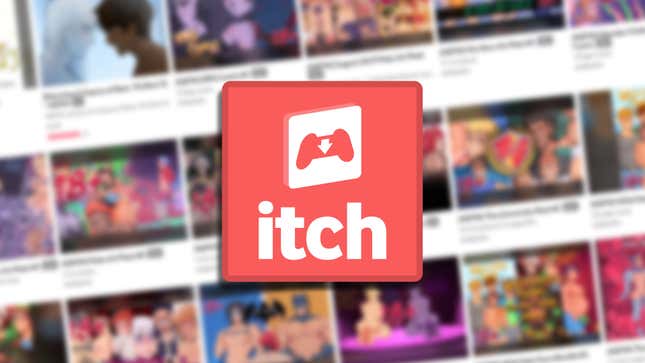
Following on from Steam’s delisting of hundreds of extreme adult games, indie gaming site Itch.io has made the even more extreme move of (in some cases temporarily) removing all NSFW games from its store pages and search results. The action, made in response to pressure group Collective Shout, has led to even this year’s IGF Grand Prize winner vanishing from the store.
Describing the measure as “critical,” Itch released a statement explaining the draconian move—conducted with no warning—is the site “acting urgently” while it conducts “a comprehensive audit of content,” but added that some games would not return.
On July 15, Valve began removing hundreds of porn-themed games from the formerly extremely liberal Steam store, following pressure from payment handling companies, themselves responding to pressure from Australian anti-porn campaign group, Collective Shout. Following the brief hosting of a game called No Mercy, both Steam and Itch became the target of a great deal of media attention, with the game eventually pulled from sale by both its hosts and its creators.
At the time, Valve were removing only extreme porn titles, almost all related to rape and incest, leading many to find the move difficult to oppose. However, it was also pointed out that such moves, when carried out as haphazardly and unclearly as this—with responsibility for content guidelines handed to external financial corporations—inevitably lead to overreach, and LGBTQ+ games and those that explore controversial topics will always be the first to be unfairly affected. As we wrote last week,
One of the real positives of Valve’s incredibly liberal approach to what it will sell is that it allows incredibly complex and difficult topics to be explored by brave developers. People regularly interrogate their own traumas through visual novels and interactive fiction, while others explore their sexual kinks via similar mediums. Victims of incest might want to create incredibly challenging games that process such experiences in healthy and productive ways—what happens here if it’s to turn out that “certain kinds” of adult themes includes such topics?
On July 23, far more extreme moves were made by Itch.io, the colossal indie game store best known for its massive fundraising drives for various causes. It “shadow banned” every game marked “NSFW” (“not safe for work”) on the store, meaning they would not appear on the store’s main pages, nor in indexed search results. Without a direct link, any such game is now impossible to find. In this process, swathes of LGBTQ+ games have vanished from the online store, including titles from high profile LGBTQ+ developers like Robert Yang. (You can still find all of Yang’s games via his direct link if you’re logged in.)
Even more extraordinarily, this year’s Seumas McNally Grand Prize award winner at the prestigious IGF Awards, Consume Me, is no longer appearing on Itch. (You can still find it on Steam.) The game, a piece about disordered eating during teenage years, is a semi-autobiographical work that bravely explores a complex and difficult topic. Its developer, Jenny Jiao Hsia, responsibly marked the game as “adult” on Itch due to the sensitive topic and occasional semi-nudity, and as such her game is now delisted.
Collective Shout is an anti-porn Australian pressure group that has learned by applying pressure to payment providers, it can indirectly control the content of sites that depend on online payments. In response to their recent actions, carried out in the name of “challenging the objectification of women and sexualization of girls in media, advertising and popular culture,” they have been inundated with wretched online misogyny. Obviously many will be very receptive to their stated goals of protecting children from porn and objecting to games that simulate rape. Others will point out that the blunt tools of censorship do little to educate audiences, and inevitably lead to vast amounts of collateral damage.
It seems reasonably likely that Consume Me will return to Itch after the site’s “comprehensive audit of content,” given how egregious it is that it should be removed in any situation. But what about the games exploring topics related to gay sex by Yang? Or the thousands and thousands of other sex- and kink-based games that are now missing? Itch’s statement says it plans to “introduce new compliance measures,” where NSFW games will be required to “confirm their content is allowable under the policies of the respective payment processors linked to their account.”
“This is a time critical moment for itch.io,” the statement reads. “The situation developed rapidly, and we had to act urgently to protect the platform’s core payment infrastructure. Unfortunately, this meant it was not realistic to provide creators with advance notice before making this change. We know this is not ideal, and we apologize for the abruptness of this change.”
Again, what is “allowable” according to payment processors is the most extraordinary deferment of responsibility, and of course an ever-shifting goalpost that developers can never be in a position to discern. Mastercard and Visa’s moral objections seem like the most bewildering standard to adhere to, and are already being wielded without any notion of nuance. What is the difference in the eyes of a behemothic financial corporation between a porn game about incestuous rape, and an introspective game in which a developer interrogates their own childhood experiences of incestuous rape?
“We ask for your patience and understanding as we navigate this challenging period,” says Itch of its sudden and sweeping move. “I’m sorry we can not share more at this time as we are still getting a full understanding of the situation ourselves.”
We’ve reached out to Itch to ask when the store will resume sales of games that clearly aren’t in violation of any standards issues, and to see if we can get any clarity regarding how developers are supposed to know what is “allowable” in the eyes of payment processors.
.